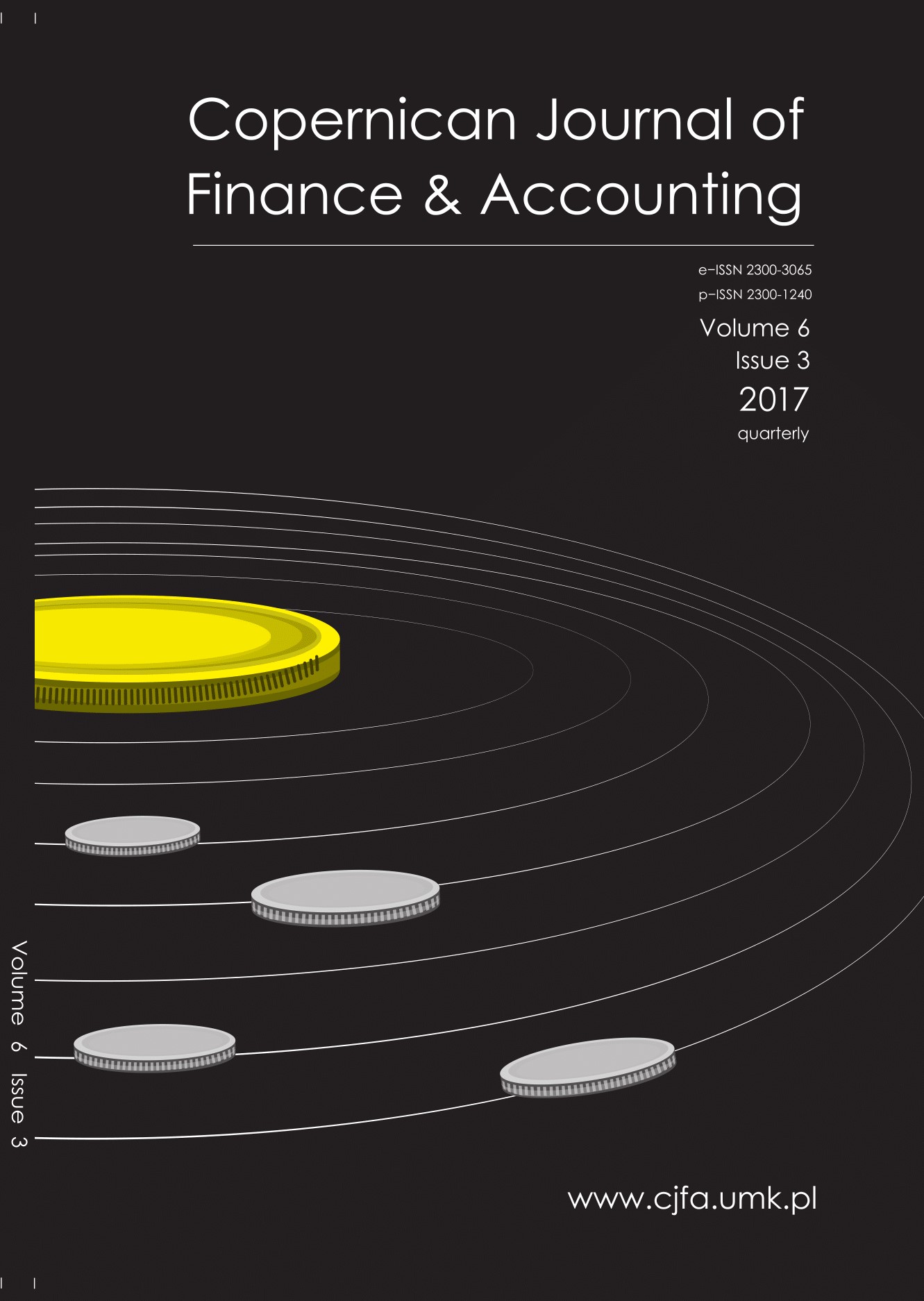NON-FINANCIAL INFORMATION AND INTEGRATED REPORTING IN THE HOSPITALITY INDUSTRY: CASE STUDY OF CROATIA
DOI:
https://doi.org/10.12775/CJFA.2017.019Keywords
Directive 2014/95/EU, non-financial information, sustainability, integrated reporting, hospitality industry, CroatiaAbstract
Subsequent to the Directive 2014/95/EU (EUDNFI) and Croatian Accounting Act (CAA), available non-financial information disclosed by Croatian hospitality companies in non-financial (sustainability) reports were analysed for their breadth and quality using the content analysis method The results of preliminary research of hospitality industry were used in order to explore the specifics of non-financial reporting in the hospitality industry, using case study method. Results reveal the highest scores among the quality principles is timeliness, among areas are environment, labour practice, and community/society, and an overall score to be 7.67 (out of 30). The lowest scores of quality principles were reliability and comparability, whereas areas were product and human rights. The results point to a need for establishing a framework for disclosing non-financial information in reports to make them useful to internal and external users. Therefore, relevant opinions of experts, bodies and associations, such as CSR Europe, International Integrated Reporting Council, GRI’s Corporate Leadership Group, will be considered in creating a model, with a particular emphasis on the globally accepted sustainability accounting standards.
References
CAA (2016). Croatian Accounting Act, consolidated text – published in the Official Gazette (OG) NO 78/15, 134/15 and 120/16.
Camodeca, R., & Almici, A. (2017). Implementing Integrated Reporting: Case Study from the Italian Listed Companies, Accounting and Finance Research, 6 (2), 121–135. https://doi.org/10.5430/afr.v6n2p121.
Carels, C., Moroun, W., & Padia, N. (2013). Integrated Reporting in the South African Mining Sector, Virtus Nter Press, Corporate Ownership & Control, 11 (1), 947–961. http://doi.org/10.22495/cocv11i1c11p6.
CLGir (2016). Forging a path to integrated reporting – Insights from the GRI Corporate Leadership Group on Integrated Reporting. GRI Empowering Sustainable Decisions. Amsterdam. The Netherlands.
CSREU (2017). Your Manual on the EU Directive for the Disclosure on Non-Financial Information, CSR Europe – Corporate Social Responsibility Europe & Enterprise 2020.
De Villiers, C., Rinaldi, L., & Unerman, J.(2014). Integrated Reporting: Insights, gaps and an agenda for future research. Accounting, Auditing & Accountability Journal, 27(7), 1042-1067. http://dx.doi.org/10.1108/AAAJ-06-2014-1736.
Dumitru, M., Glavan, M.E., Gorgan, C., & Dumitru V.F. (2013). International Integrated Reporting Framework: A Case Study in the Software Industry, Annales Universitatis Apulensis Series Oeconomica, 15 (1), 24–39.
Eccles, R.G. & Spiesshofer, B.(2015). Integrated Reporting for a Re-Imagined Capitalism. Harvard Business School, Working Paper No 16.032.
Eccles, R.G., & Serafeim, G. (2014). Corporate and Integrated Reporting: A Functional Perspective. Harward Business School, Working Paper, 14-094, 1–15.
EUDNFI (2014). Directive 2014/95/EU, Official Journal of the European Union. Text with EEA relevance. http://eur-lex.europa.eu/legal-content/EN/TXT/PDF/?uri=CELEX:32014L0095&from=HR (accessed: 02. 06. 2015).
EY (2014). Integrated reporting – Elevating value. EY – Building a better working world. EYGM Limited. EYG No. AU2354.
Gorgan, C., Dumitru, V.F., & Gorgan, V. (2014). Key Performance Indicators. A Case Study on the Integrated Reports of an IT Company, Annals of the “Constantin Brancusi” University of Targu Jiu, Economy Series, 3, 111–118.
GRI (2016). GRI 101: Foundation 101. GRI Global, GRI 101 (1), 29. https://www.globalreporting.org/standards/gri-standards-download-center/ (accessed: 14. 01. 2017).
GRI G4 (2015). G4 Sustainability Reporting Guidelines – Reporting Principles and Standard Disclosures, The Global Sustainability Standards Board (GSSB). Amsterdam, Netherlands www.globalreporting.org.
GRIs (2016). The Next Era of Corporate Disclosure – Digital, Responsible, Interactive, Sustainability and Reporting 2025 Project: GRI – Empowering Sustainable Decisions, Amsterdam The Netherlands. www.globalreporting.org.
Hoque, M.E. (2017). Why Company Should adopt Integrated Reporting. International Journal of Economics and Financial Issues, 7 (1), 241–248.
Hoque, Z. (2006). Strategic Management Accounting, Concepts, Processes and Issues, 2nd Edition, Australia: Pearson Education Australia, Frenchs Forest.
IFAC (2015). Materiality in IR – Guidance for the preparation of integrated reports. IR _ Integrated Reporting. IFAC – International Federation of Accountants.
IIRC (2013). Business and Investors explore the sustainability perspective of Integrated Reporting. The IIRC Pilot Programme Yearbook 2013. http://integratedreporting.org/wp-content/uploads/2013/12/IIRC-PP-Yearbook-2013_PDF4_PAGES.pdf (accessed: 22.05.2017).
IIRC (2016). Journey to Breakthrough, IIRC Integrated Report 2016. http://integratedreporting.org/wp-content/uploads/2017/07/IIRC_IR2016_IntegratedReport.pdf (accessed 22. 05. 2017).
IR (2016). Creating Value – The cyclical power of integrated thinking and reporting, IIRC– The International Integrated Reporting Council. http://integratedreporting.org/wp-content/uploads/2016/11/ CreatingValue_IntegratedThinking_.pdf (accessed: 15. 01. 2017).
IR Framework (2013). The International “IR” Integrated Reporting Framework, The InternationalIntegrated Reporting Council (IIRC). https://integratedreporting.org/wp-content/uploads/2013/12/13-12-08-THE-INTERNATIONAL-IR-FRAMEWORK-2-1.pdf (accessed: 29. 03. 2015).
Jones, T., Atkinson, H., Lorenz, A., & Harris, P. (2012). Strategic Managerial Accounting –Hospitality, Tourism & Events Applications, 6Ed, Goodfellow Publishers, Ltd.
Mio, Ch. (Ed.) (2016). Integrated Reporting – A New Accounting Disclosure, Palgrave Macmillan Publishers Ltd. London, https://doi.org/10.1057/978-1-137-55149-8.
Peršić, M., & Halmi, L. (2016). Disclosing non-financial information in companies’ reports in Croatia, Copernican Journal of Finance & Accounting, 5 (2), 181–200. http://dx.doi.org/10.12775/CJFA.2016.022.
PWC (2012). Integrated Reporting – The Future of Corporate Reporting – A guide on integrated reporting highlighting the kay content elements and principles of good reporting practices for your company. AG Wirtschaftsprüfungsgesellschaft. PricewaterhouseCoopers.
PWC (2015). Implementing Integrated Reporting – PWC’s practical guide for a new business language. PricewaterhouseCoopers LLP. UK.
SASB (2017). SASB Rules of Procedure, Sustainability Accounting Standard Board (SASB), San Francisco, CA, USA.
Serafeim, G. (2016) Integrated Reporting – Statement on Management Accounting, IMA –The Association of Accountants and Financial Professionals in Business, The Americas, Asia/Pacific, Europe and Middle East/Africa, Montvale, NJ.
Valamar (2015). Integrated Company Annual Report and Corporate Social Responsibility, Valamar Riviera, Poreč, Croatia, 1–58, http://valamar-riviera.com/en/investors/financial-news/integrated-company-annual-report-and-corporate-social-responsibility-2015/ (accessed: 24. 02. 2017).
Valamar (2016). Integrated Company Annual Report and Corporate Social Responsibility, Valamar Riviera, Poreč, Croatia, 1-174, http://valamar-riviera.com/media/139229/integrated-company-annual-report-and-corporate-social-responsibility-2016.pdf (accessed: 24. 02. 2017).
Downloads
Published
How to Cite
Issue
Section
Stats
Number of views and downloads: 886
Number of citations: 0



